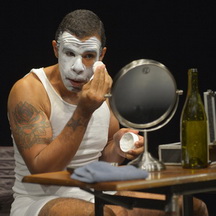Musical chameleon channels an American maestro at Berkeley Rep
Last year Hershey Felder was George Gershwin. This year he’s Leonard Bernstein. He’s also been Frederick Chopin and Franz Liszt, and he may slip into their skins again. Who knows?
When does he find time to be Hershey Felder?
All the time, actually. Lest you think the guy is a schizo with a yen for musical genius, you should know that he’s a musical genius, all right, but far from schizo. In fact his genius extends beyond music into impersonation. He’s a skilled actor, in other words. He “became” George Gerswin at Berkeley Rep last summer, in a one-man show that detailed Gershwin’s career, accompanied by stirring piano accompaniment and fine-voiced singing, and he’s back this summer with another compelling artistic bio, “becoming” Leonard Bernstein in another one-man show called Maestro.
I saw Bernstein conduct only once, at Avery Fisher Hall in Lincoln Center (it was an Aaron Copeland program), but I remember him most fondly from his televised music seminars for kids, which enthralled me when I was a teen. They revealed him to be a great teacher, precise and passionate, so I looked forward to Felder’s Rep reincarnation, and I wasn’t disappointed.
The show’s 100 uninterrupted minutes take place on a stage featuring a handsome grand piano and a tall swath of drapery on which images are projected, of Bernstein teaching and conducting and smiling with his wife and kids, of the likes of Beethoven and Tchaikovsky, and especially of his Russian émigré father, who becomes a sort of obsession: will Papa ever approve?
In fact Maestro begins with young Lenny at home with Papa, who is a cliché of the devout old-world Jew with his nose sunk in the Talmud, who wants his son to choose a profession where he’ll make money. Making music doesn’t count, but Papa eventually relents. How could he not, to such an obsessed son who is so sure of his talent that he brags of it to anyone in sight?
At one point in Felder’s show, Leonard Bernstein cries out, arms uplifted, that he is God himself.
If this suggests that Felder depicts Bernstein warts and all, he does. As he climbs the ladder of success, passing through the hands of Aaron Copeland, Fritz Reiner and his beloved Serge Koussevitsky, the “father” he always longed for, we feel the anxiety under all his crowing, the desperate need to be not just a great conductor, which he was, but a great composer, too, which he probably was not. We see his cruelty to his wife. We also see his homosexuality, with no coy attempt to gloss over it, and indeed why should there be?
Felder is a deft and vigorous pianist, so he gives us rousing excerpts from Schumann and Shostokovitch and Grieg, and from Bernstein too, from his serious work but most notably from his Broadway shows: On the Town, Wonderful Town. Candide, and (wait for it) West Side Story, from which we hear several of those famous, bittersweet melodies of youthful longing. Bernstein dismisses West Side Story as romantic piffle, but at the end of his life he’s forced to face a truth that shakes him: West Side Story, rather than one of his symphonies, like the Jeremiah, or his opera, Trouble in Tahiti, is likely what he’ll be remembered for.
Leonard Bernstein was great in more than one way, but not in the way he hoped.
Showcasing Hershey Felder’s dual talents, Berkeley Rep’s very watchable and listenable production is directed by Joel Zwick, with expert help from François-Pierre Couture (set and lighting), Andrew Wilder (projections), Margaret Hartmann and Christopher Rynne (lighting), and Erik Carstensen (sound).
Maestro has been extended through July 3rd. The Rep’s 2014-15 season begins in September with An Audience with Meow Meow. For tickets/information, call 647-2949 or visit www.berkeleyrep.org.
– ROBERT HALL
